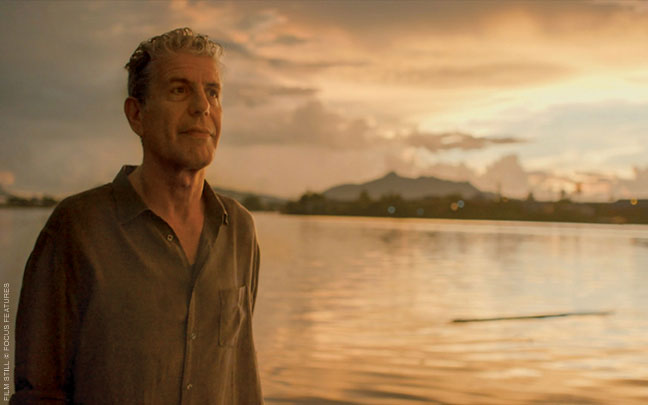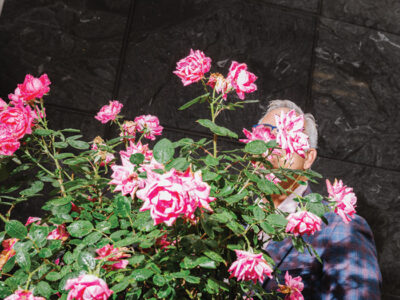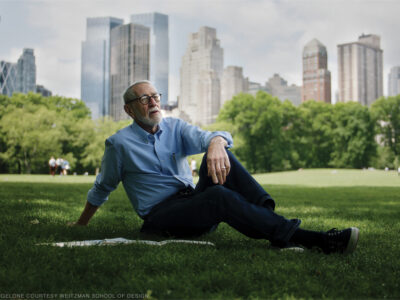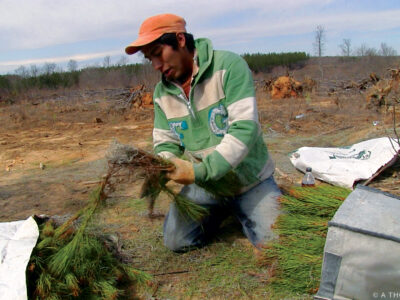
In Roadrunner, Morgan Neville probes the many sides of Anthony Bourdain.
“It is considered useful and enlightening and therapeutic to think about death for a few minutes a day.”
So begins Roadrunner, Morgan Neville C’89’s documentary about Anthony Bourdain, released in July. Voiced by the celebrated chef-turned-author and travel-show star, whose 2018 suicide hangs over the film, the assertion doubles as a sort of ventriloquism signaling Neville’s intent. Stitching video from Bourdain’s exhaustively documented midlife into a patchwork of postmortem ruminations by grieving friends, Roadrunner offers a stirring meditation on travel, fame, obsession, the search for meaning, and the fleeting nature of fulfillment when it is chased too hard.
To a filmmaker who specializes in profiling famous artists and performers—most recently PBS icon Fred Rogers (Won’t You Be My Neighbor?) and Orson Welles (They’ll Love Me When I’m Dead)—Bourdain’s exploits presented an extreme case study in the transformative power of the public glare. Bourdain spent 16 years eating his way around the world in front of a camera crew. Roadrunner makes a feast of the footage left on the cutting room floor. What aired on the shows, Anthony Bourdain: Parts Unknown director Tom Vitale tells Neville, were “the least interesting parts of the trip.”
Mining older material from an unreleased documentary shot by Dmitri Kasterine, Neville takes viewers back even further, revealing Bourdain as an unheralded 43-year-old chef suddenly reincarnated by celebrity thanks to his 2000 memoir Kitchen Confidential, a breakout bestseller that grew out of an unsolicited submission to the New Yorker the year before. One minute Bourdain is phoning in a vegetable order from the sidewalk behind his restaurant kitchen; the next he is half-stunned by an invitation from Oprah Winfrey. “My life gets more and more ridiculous,” he says. “When my 15 minutes of fame are up, I will be comfortable with that, if not relieved. I think relieved, at this point.”
Relief, of course, quickly vanished from the menu. He staggered at the start. One of Roadrunner’s revelations, courtesy of Bourdain’s first producers, is how uncomfortable and awkward he was before he morphed into one of the most complexly riveting presences on TV—an “unmuscled James Bond” who could engage with anyone, in producer Lydia Tenaglia’s apt description. But once he rounded that corner, there was no turning back. “It was like he died and was reborn,” Bourdain’s brother Chris tells Neville. “This was a new person with a new life.”
The casualties included Bourdain’s marriage of 20 years, and then a second marriage, which lasted nine and produced a daughter. Few relationships can survive one party hitting the road for 250 days a year. And while Bourdain lived one fantasy—a made-for-TV thrill ride where dinner might be feral pigeon or a beating cobra’s heart, but there always seemed to be a cold beer or a grand cru vintage close at hand—he pined for a different one, romanticizing the domestic bliss marked by dad aprons and backyard barbecues. Yet there was nothing like being in one setting to make him yearn for another.
Neville’s autopsy ranges widely—and is too engaged with Bourdain’s soulful complications to get bogged down in maudlin sentimentality—but Roadrunner provokes the most thought as an exploration of fantasy’s perils. Bourdain lionized adventurers who legitimized even “antisocial” escapades by writing about them. “I wanted to go to faraway exotic places with palm trees where teenagers in army uniforms carried machine guns,” we hear Bourdain say. (Neville used an AI voice generator to convert Bourdain’s writing into speech in three instances, only one of which is obvious. Whether that fundamentally violates a boundary not crossed by commonly accepted forms of artifice in documentary filmmaking, like quotation splicing, or third-party voiceover of written correspondence, is a worthwhile debate—but its impact on the shape and substance of Roadrunner seems slight.) Yet the chef had never really travelled, reflects Tenaglia, who produced his first TV series: “I think he was excited to go on this journey to see if the reality actually matched the imagination.”
But a traveler’s fantasies shape what he sees, and how he sees himself. Neville intercuts his documentary with scenes from swashbuckling pirate flicks, Werner Herzog’s Aguirre, The Wrath of God, and, most liberally, Apocalypse Now to suggest a certain trajectory to Bourdain’s mental peregrinations. Lying on a therapist’s couch (because even that was filmed), Bourdain also confesses to “momentary fantasies of harming others or myself.” The man with 2 million Instagram followers sensed that he was looking at life through an “ever narrowing lens”—one that channeled virtually everything, even the lonely hotel rooms he filmed and posted from his phone, for public consumption. “It is written that I should be loyal to the nightmare of my choice,” he muses in an archival voiceover. “I think I now understand what that means.”
Bourdain’s survivors delve into the fluctuating distance that separated his persona from his personality—and the shrinking space between his public life and any possibility of a private one. “He often talked about how in an ideal world, he wouldn’t be in the show,” says Vitale. “It would be his point of view, like a camera moving through space without having to see him, at all.”
Yet it was Bourdain’s point of view—open, unflinching, and at times almost excruciatingly humane—that made him as vulnerable as he was captivating. A turning point came in 2006, when war broke out in Beirut during the filming of a No Reservations episode, filling the crew and the star with deep ambiguity about the nature of their work. “I’d begun to believe that the dinner table was the great leveler,” Bourdain ultimately reflected in a voiceover for the show. “Now, I’m not so sure. Maybe the world’s not like that at all. Maybe in the real world, the one without cameras and happy food and travel shows, everybody, the good and the bad together, are all crushed under the same terrible wheel. I hope, I really hope, I’m wrong about that.”
Neville reveals that Bourdain initially opposed “exploiting” his Beirut experience for 42 minutes of TV entertainment, but the Travel Channel felt otherwise. The episode won an Emmy.
Existential angst never stopped haunting Bourdain. That’s what made him such a compelling interpreter of the places he passed through. In the view of his friends and colleagues, it also made him prey to serial obsessions in which he sought respite—from the drug addictions of his early adulthood, to jiu-jitsu, to the #MeToo proselytizing spurred by an ill-starred romantic involvement with Asia Argento, the Italian actress and filmmaker who was an early accuser of Harvey Weinstein for sexual assault, and who is cast here as a catalyst of Bourdain’s demise. (He hung himself shortly after discovering paparazzi snapshots of her in the arms of another man. Neville opted not to interview Argento for his film.)
While Neville gives plenty of space to that tragic final chapter, Roadrunner functions best as an exploration of what distinguished Bourdain from so many other culinary celebrities: his insistence on searching for meaning at the core of every experience—and his refusal to be fully satisfied with, or absolutely sure about, what he found.
“It was almost never about food,” fellow chef David Chang reflects. “It was about Tony learning how to be a better person.”
It’s hard work for the best of us. —TP




